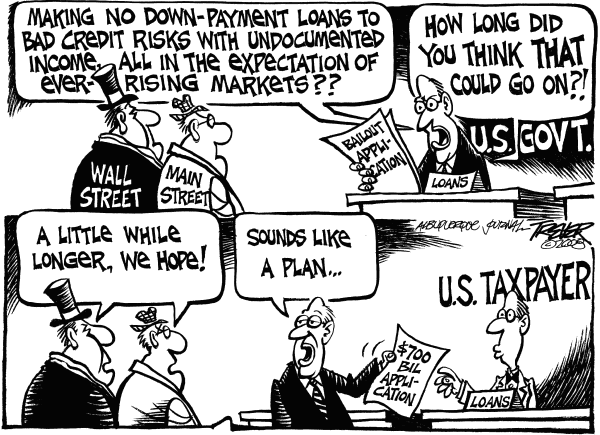Search
Recent comments
- furphy....
37 min 14 sec ago - nothing new....
1 hour 9 min ago - blood brothers....
2 hours 6 min ago - germanic merde....
2 hours 11 min ago - englishit....
3 hours 54 min ago - kurdylord....
4 hours 4 min ago - a win!....
4 hours 9 min ago - sad....
4 hours 16 min ago - closed....
16 hours 31 min ago - no excuses....
20 hours 58 min ago
Democracy Links
Member's Off-site Blogs
permabear .....

In the 1980s Gore Vidal observed of Reagonomics: "The US government prefers that public money go not to the people but to big business. The result is a unique society in which we have free enterprise for the poor and socialism for the rich."
His epigram has been repeatedly recalled this week following the nationalisation of American International Group, the world's biggest insurer, coming shortly after the similar rescue of the Fannie Mae and Freddie Mac housing companies and of the Bear Stearns bank.
"Socialised capitalism" is Robert Reich's description.
"Gains privatised and losses socialised" was the more pointed comment by Nouriel Roubini, professor of economics at the Stern School in New York University. He is known in the economics trade as a "permabear" because of his repeated claims over the last six years that a financial system based on self-regulation, non-deposits, highly leveraged subprime housing debts and globalised derivatives trading was unsustainable and would collapse.
Roubini is unusual among economists in combining comparative, historical and mathematical analysis, giving him a broader appeal to policymakers and the mass public. In an interview with the New York Times magazine on August 18th, he described himself as more a realist than a pessimist.
He argues that the AIG should have been bankrupted rather than nationalised, and the $85 billion of taxpayers' money loaned to the firm could have been used instead for debtor-in-possession financing.
This would have allowed for a more fair process for allocating losses between shareholders and short-term and long-term creditors of the firm. Nationalisations like this are prejudiced in favour of those responsible for the trouble in the first place.- By John Richardson at 4 Oct 2008 - 7:23pm
- John Richardson's blog
- Login or register to post comments
rescuing the guilty .....
Americans, for the most part, will never know what happened to them, because they no longer have a free and responsible press. They have Big Brother’s press.
For example, on September 28, 2008, a New York Times editorial blamed the current financial crisis on “anti-regulation disciples of the Reagan Revolution.”
What utter nonsense. Every example of deregulation that the New York Times editorial provides is located in the Clinton Administration and the George W. Bush administration. I was a member of the Reagan administration. We most certainly did not deregulate the financial system.
The repeal of the Glass-Steagall Act, which separated commercial from investment banking, was the achievement of the Democratic Clinton Administration. It happened in 1999, over a decade after Reagan left office.
It was in 2000 that derivatives and credit default swaps were excluded from regulation.
The greatest mistake was made in 2004, the year that Reagan died. That year the current Secretary of the Treasury, Henry M. Paulson Jr, was head of the investment bank Goldman Sachs. In the spring of 2004, the investment banks, led by Paulson, met with the Securities and Exchange Commission.
At this meeting with the New Deal regulatory agency tasked with regulating the US financial system, Paulson convinced the SEC Commissioners to exempt the investment banks from maintaining reserves to cover losses on investments. The exemption granted by the SEC allowed the investment banks to leverage financial instruments beyond any bounds of prudence.
The End of American Hegemony